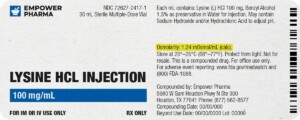Antidiabetic agents: Alpha lipoic acid has been shown to increase glucose utilization and decrease insulin resistance. Patients receiving antidiabetic agents in combination with ALA may be at increased risk for hypoglycemia; dosage adjustments of antidiabetic agents may be necessary. Furthermore, patients should be instructed to monitor their blood glucose concentrations while taking ALA. In one study, some patients with type 2 diabetes mellitus receiving both ALA and sulfonylureas required a dose reduction in the sulfonylurea due to mild symptoms of hypoglycemia (Jacob et al, 1999)
Drugs that decrease the effects of antidiabetic agents: Alpha lipoic acid has been shown to increase glucose utilization and decrease insulin resistance. Patients receiving other drugs that may increase blood glucose concentrations or insulin resistance may counteract the beneficial effects of ALA. Such drugs include anti-retroviral protease inhibitors, atypical antipsychotics, beta-blockers, corticosteroids, cyclosporine, dextrothyroxine, diuretics, glucagon, isoniazid, INH, niacin, phenothiazines, somatropin, rh-GH, sympathomimetics, tacrolimus, triamterene, and thyroid hormones. NOTE: This list is not inclusive of all drugs that can decrease the effects of antidiabetic agents.
Drugs that increase the effects of antidiabetic agents: Alpha lipoic acid has been shown to increase glucose utilization and decrease insulin resistance. Patients receiving other drugs that may decrease blood glucose concentrations or insulin resistance may enhance the beneficial effects of ALA, possibly causing hypoglycemia. Such drugs include ACE inhibitors, androgens, bortezomib, chromium, disopyramide, fibric acid derivatives, garlic, Allium sativum, green tea, guanethidine, horse chestnut, Aesculus hippocastanum, MAOIs, octreotide, and orlistat. Patients with diabetes taking ALA plus any of these other drugs should be advised to monitor their blood glucose concentrations. NOTE: This list is not inclusive of all drugs that increase the effects of antidiabetic agents.
Drugs that increase or decrease the effects of antidiabetic agents: Alpha lipoic acid has been shown to increase glucose utilization and decrease insulin resistance. Patients receiving other drugs that may increase or decrease blood glucose concentrations or insulin resistance may counteract the beneficial effects of ALA or enhance its effects and increase the risk of hypoglycemia. Such drugs include clonidine, cisapride, ethanol, lithium, metoclopramide, pentamidine, and quinolones. Patients with diabetes taking any of these drugs in combination with ALA should be advised to monitor their blood glucose concentrations. NOTE: This list is not inclusive of all drugs that may increase or decrease the effects of antidiabetic agents.
Drugs that mask the signs and symptoms of hypoglycemia: Alpha lipoic acid has been shown to increase glucose utilization and decrease insulin resistance; hypoglycemia may be possible. Patients receiving other drugs that mask the signs and symptoms of hypoglycemia such as beta-blockers, clonidine, reserpine, guanethidine in combination with ALA should be advised to monitor their blood glucose concentrations. NOTE: This list is not inclusive of all drugs that may mask the signs and symptoms of hypoglycemia.


 Sodium Bicarbonate Injection
Sodium Bicarbonate Injection BCAA Injection
BCAA Injection Metoclopramide HCl Injection
Metoclopramide HCl Injection Bacteriostatic Water Injection
Bacteriostatic Water Injection Cholecalciferol (D3) Injection
Cholecalciferol (D3) Injection Diphenhydramine Injection
Diphenhydramine Injection Ketorolac Tromethamine Injection
Ketorolac Tromethamine Injection Heparin Sodium Injection
Heparin Sodium Injection Ondansetron Injection
Ondansetron Injection Ketamine HCL Injection
Ketamine HCL Injection